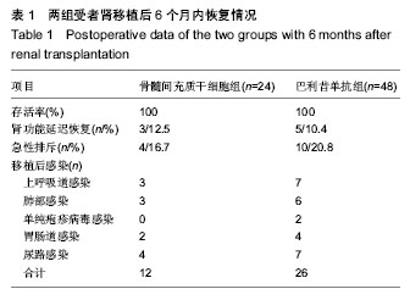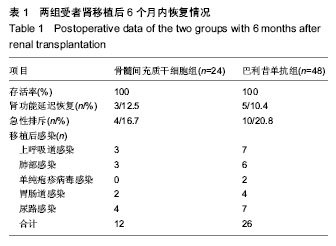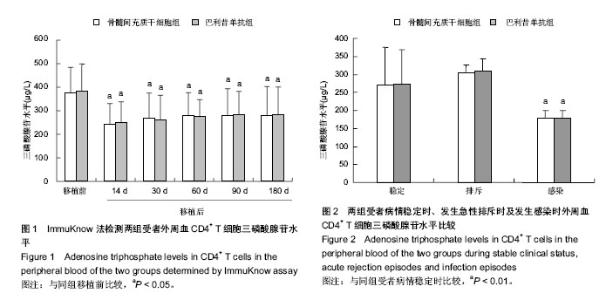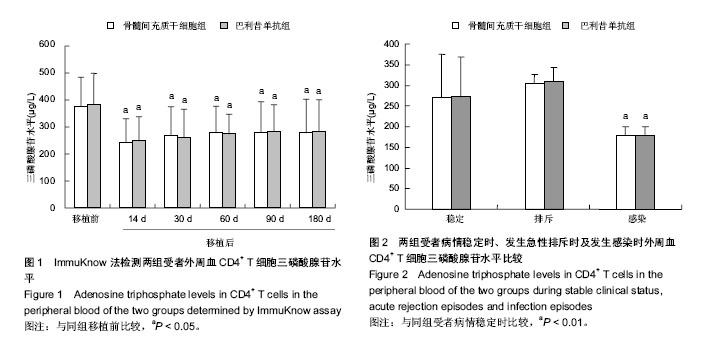| [1] Shi M, Liu ZW, Wang FS.Immunomodulatory properties and therapeutic application of mesenchymal stem cells.Clin Exp Immunol. 2011;164(1):1-8.
[2] Tan J, Wu W, Xu X,et al. Induction therapy with autologous mesenchymal stem cells in living-related kidney transplants: a randomized controlled trial.JAMA. 2012;307(11):1169-1177.
[3] Zhou H, Lin J, Chen S,et al.Use of the ImmuKnow assay to evaluate the effect of alemtuzumab-depleting induction therapy on cell-mediated immune function after renal transplantation.Clin Exp Nephrol. 2013;17(2):304-309.
[4] Hematti P.Role of mesenchymal stromal cells in solid organ transplantation.Transplant Rev (Orlando). 2008;22(4): 262-273.
[5] Sheng H, Wang Y, Jin Y,et al.A critical role of IFNgamma in priming MSC-mediated suppression of T cell proliferation through up-regulation of B7-H1.Cell Res. 2008;18(8): 846-857.
[6] Asari S, Itakura S, Ferreri K,et al. Mesenchymal stem cells suppress B-cell terminal differentiation.Exp Hematol. 2009; 37(5):604-615.
[7] Boissel L, Tuncer HH, Betancur M,et al.Umbilical cord mesenchymal stem cells increase expansion of cord blood natural killer cells.Biol Blood Marrow Transplant. 2008;14(9): 1031-1038.
[8] Spaggiari GM, Abdelrazik H, Becchetti F, et al. MSCs inhibit monocyte-derived DC maturation and function by selectively interfering with the generation of immature DCs: central role of MSC-derived prostaglandin E2.Blood. 2009;113(26): 6576-6583.
[9] Zheng ZH, Li XY, Ding J, et al.Allogeneic mesenchymal stem cell and mesenchymal stem cell-differentiated chondrocyte suppress the responses of type II collagen-reactive T cells in rheumatoid arthritis.Rheumatology (Oxford). 2008;47(1): 22-30.
[10] Ghannam S, Pène J, Moquet-Torcy G,et al.Mesenchymal stem cells inhibit human Th17 cell differentiation and function and induce a T regulatory cell phenotype.J Immunol. 2010; 185(1):302-312.
[11] Casiraghi F, Remuzzi G, Perico N. Mesenchymal stromal cells to promote kidney transplantation tolerance.Curr Opin Organ Transplant. 2014;19(1):47-53.
[12] Perico N, Casiraghi F, Gotti E,et al.Mesenchymal stromal cells and kidney transplantation: pretransplant infusion protects from graft dysfunction while fostering immunoregulation. Transpl Int. 2013;26(9):867-878..
[13] Hoogduijn MJ, Betjes MG, Baan CC. Mesenchymal stromal cells for organ transplantation: different sources and unique characteristics?Curr Opin Organ Transplant. 2014;19(1): 41-46.
[14] Pileggi A, Xu X, Tan J,et al.Mesenchymal stromal (stem) cells to improve solid organ transplant outcome: lessons from the initial clinical trials.Curr Opin Organ Transplant. 2013;18(6): 672-681.
[15] Perico N, Casiraghi F, Introna M,et al. Autologous mesenchymal stromal cells and kidney transplantation: a pilot study of safety and clinical feasibility.Clin J Am Soc Nephrol. 2011;6(2):412-422.
[16] Israeli M, Klein T, Sredni B,et al.ImmuKnow: a new parameter in immune monitoring of pediatric liver transplantation recipients. Liver Transpl. 2008;14(6):893-898.
[17] 吴琳,王瑾,王庆华,等.ImmuKnowTM-Cylex检测技术在肾移植术后重症肺炎中的应用研究[J].福建医科大学学报,2011,45(4): 267-269.
[18] 张长征,聂海波,朱云松,等.肾移植术后巨细胞病毒性肺炎患者CD4细胞三磷酸腺苷浓度测定及其意义[J].南方医科大学学报, 2010,30(5):1092-1094.
[19] Wu Z, Zhou H, Yang S,et al.Significance of CD4 T-cell adenosine triphosphate levels monitoring in elderly renal transplant recipients.Transplant Proc. 2012;44(10): 2986-2991.
[20] 王凯,高伟,朱志军,等.ImmuKnowTM免疫细胞功能检测在肝移植术后排斥反应中的意义[J].山东医药,2011,51(48):28-29,41.
[21] Torío A, Fernández EJ, Montes-Ares O,et al. Lack of association of immune cell function test with rejection in kidney transplantation.Transplant Proc. 2011;43(6): 2168-2170.
[22] De Paolis P, Favarò A, Piola A,et al."Immuknow" to measurement of cell-mediated immunity in renal transplant recipients undergoing short-term evaluation.Transplant Proc. 2011;43(4):1013-1016.
[23] Wang D, Wu W, Yang S,et al.Post-transplant monitoring of soluble CD30 level as predictor of graft outcome: a single center experience from China.Transpl Immunol. 2012; 27(4): 146-150.
[24] 洪良庆,黄正宇,欧阳斌,等.IL-12P70及IFN-γ在预测肾移植术后急性排斥反应中的应用[J].中山大学学报:医学科学版,2010, 31(3):422-427. |



